Sissy Spacek: ‘I’m very shy, and an introvert, so the Carrie shower scene was terrifying’
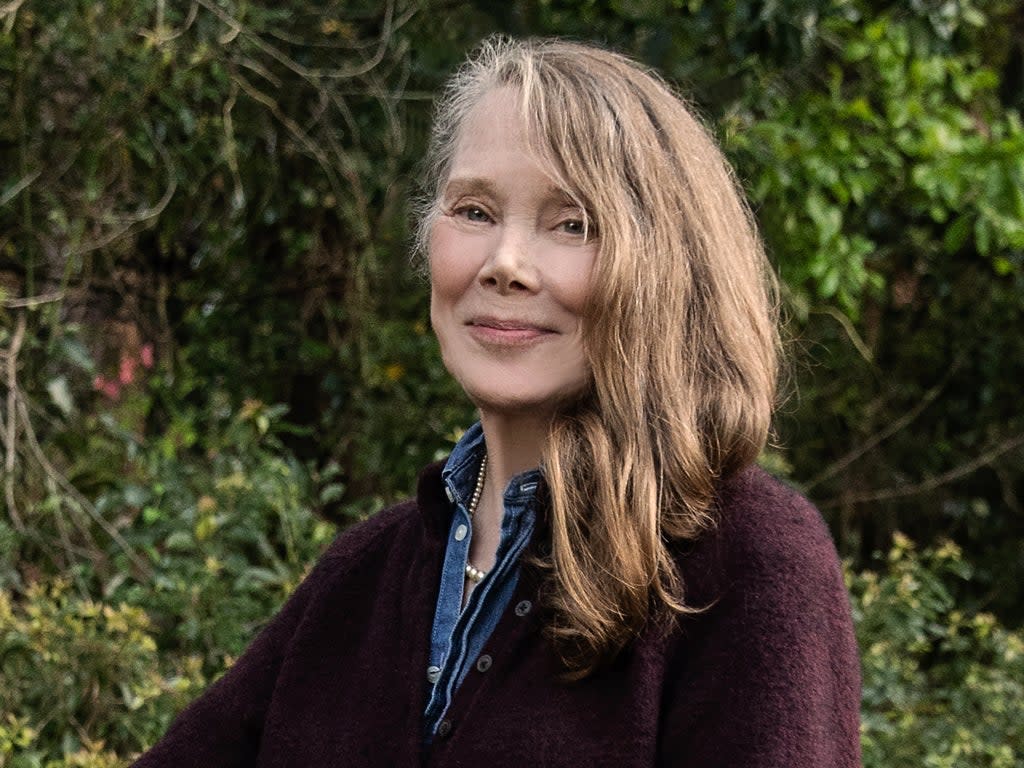
Sissy Spacek’s farmhouse is a time machine. Scattered around her Virginia spread are keepsakes from a 50-year career she’s convinced was an accident. There are notebooks upon notebooks of character ideas and song lyrics, all jammed into boxes and desk drawers. Scripts for the likes of Carrie and the Loretta Lynn biopic Coal Miner’s Daughter – for which she won an Oscar – with drawings scribbled in the margins. Swiped from the set of Terrence Malick’s lovers-on-the-run classic Badlands, a door knocker shaped like a butterfly and a plaster-of-Paris toad. Mementos of the women she once knew. “I try to always take some tiny little thing from each project,” the 72-year-old says tenderly. “Something worthless to anyone but me.”
Many would disagree. Spacek’s characters have clung to culture like barnacles. She’s often approached by fans with Carrie tattoos – the image of a blood-soaked prom queen, eyes nightmarishly wide, is seemingly tailor-made for shoulders and limbs. One fan, Spacek remembers, recently came up to her and yanked up their trouser leg to reveal the Badlands logo marked along their shin. I tell her that my housemate sleeps with an original Badlands poster over his bed, too. “Oh my gosh!” she laughs. “But that’s also not very shocking to me.”
Sadly, we’re not in her farmhouse today, but in video panels over Zoom. A relaxed and glowing Spacek is calling from New York and promoting Night Sky, a sci-fi parable launching this week on Prime Video. The technological wizardry surrounding her seems wrong. I imagine Spacek in long grass or on an open highway, her presence so associated with the rustic, American heartland that the Amazon logo beneath her is throwing me off. She smiles with the whole of her face, though, when I ask about her farmhouse, which she’s called home since the early Eighties. After realising they’d become too enmeshed in the rhythms of Hollywood – where every real-life bit of misery was met by a cry of “That’d make a great movie!” – she and her production-designer husband Jack Fisk fled Los Angeles for the country.
“We have fireflies and lightning bugs,” Spacek says, her voice a husky drawl built for bedtime stories. “Nature is my church; it’s where I find solace.” Working on Night Sky in the grassy knolls of rural Illinois reminded her of her earliest years. She was born and raised in Quitman, a Texas suburb so small that her birth is listed on its Wikipedia page as its most notable historical achievement. She was as much a stargazer then as she is now. “Oh, I started as a young child,” she recalls. “Every little kid probably goes out and lies on a blanket at night, staring up at the stars and contemplating infinity. I still can’t quite get my head around that.” She pauses, lost in the memory. “Infinite! Infinite! It’s never-ending! I mean, there are probably things up there so much more bizarre than what Franklin and Irene are experiencing. Can you imagine?”
Franklin and Irene are the heroes of Night Sky. As played by Spacek, Irene is a grief-stricken retiree largely confined to a wheelchair after an accident. Franklin, embodied by the wonderfully taciturn Whiplash and Spider-Man star JK Simmons, is her doting husband, the crotchety finger-wagger who loves her. Every evening, the pair venture into a hidden chamber beneath their shed, which houses a portal to another planet. They sit in a gently whirring observation deck, looking out over a desolate alien landscape. What’s out there? They don’t know. But Irene, specifically, finds comfort in the unknown. According to a multi-page document sent over by Prime Video, discussing anything else that happens in the show would constitute a spoiler, so let’s just say that there’s more to the chamber and more to the show’s dense extraterrestrial mythology.
But Night Sky is at its best when Spacek and Simmons are sitting in their kitchen, gently ruminating on age and marriage. It’s what appealed to Spacek, too. “It’s the core of the story. I’d worried about the sci-fi part because I’d never experienced anything like that before, but then I realised that Irene is just a person. She didn’t need experience in sci-fi, she just needed to be curious.”
Whenever Spacek chooses to work on something, she requires two things: something she can easily latch on to, but also something she can reach for. “I need some part of it that frightens me.” It’s partly why she’s always been selective, her career marked by recurring hiatuses from acting. “I know that I can’t do everything,” she says. “There have been great roles [that I’ve been offered], but they weren’t things I had an understanding of. So they obviously didn’t belong to me.”
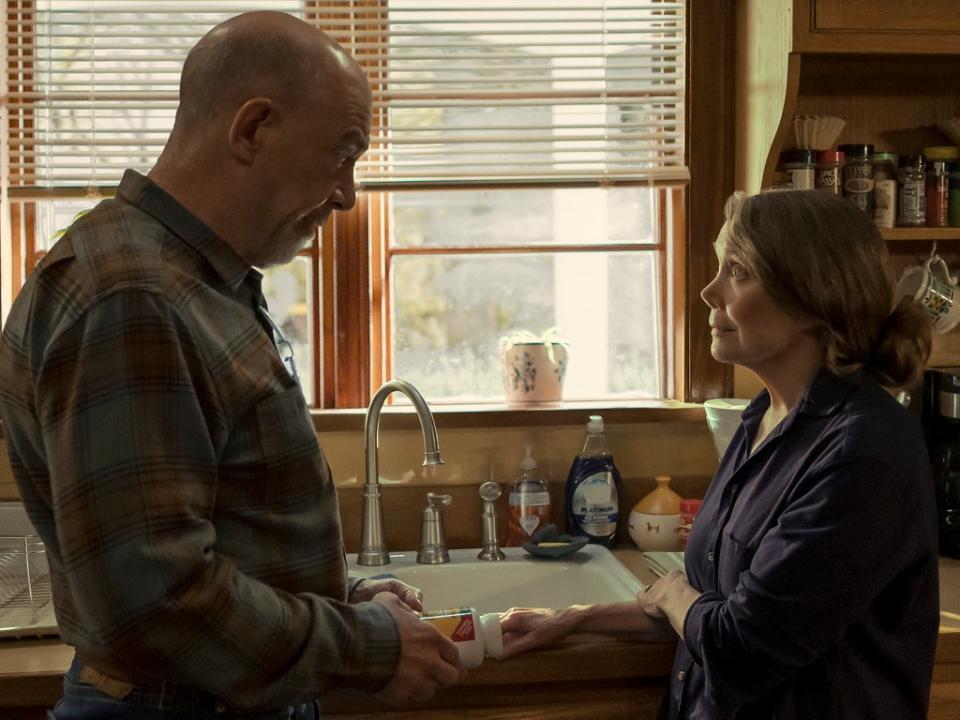
The ones that did have had incredible staying power. As the lonely telekinetic in Carrie, or as a restless switchboard operator in the Second World War drama Raggedy Man, she is hauntingly fragile. But there also tends to be an eerie grit behind those ocean-blue, feline eyes: the airy disaffect she brings to Badlands, or how spookily she studies the far more gregarious Shelley Duvall in Robert Altman’s 3 Women. When she throws a dinner plate to the kitchen floor in the suburban drama In the Bedroom, it feels as shocking as it does inevitable.
There are people who are far more talented than me, great artists who don’t ever get the break
Spacek left Quitman at 17, seduced by the potential of New York City. Her cousin, the late actor Rip Torn, had already set up shop there as an actor, and the young Spacek decided to try on for size elements of his life: she modelled, auditioned for acting roles, and hung out at Warhol’s Factory. She had initially wanted to be a musician, but outside of supplying vocals for a few novelty singles – including one, which thankfully she didn’t write herself, about being disappointed by John Lennon’s nude album cover for Two Virgins – she couldn’t catch a break. “Music is what I wanted to do, but doors never really opened for me like they did with film,” she says, almost wistfully. “Acting just swept me away.”
She talks of her career a bit like she’s the Carrie of it all – more or less a bystander, always lurking on the sidelines studying the actions of others. “I had the great fortune to come into contact with people who were really amazing artists,” she explains. “When I met Terrence Malick for Badlands, that’s when I understood that film could be an art form. It’s not just actors on a screen.”
It was while working on Badlands that Spacek met Fisk, and subsequently his best friend David Lynch. Decades later, Lynch would cast Spacek in one of his less head-spinning films, the 1999 road movie The Straight Story. Her casting in it seems appropriate: she plays a kind-hearted woman who can’t help but see the world at its most pure. Spacek sees herself as being very different from Lynch and her husband. “They live the art life,” she says. “Jack knew David as an artist in the eighth grade – they were the only two people they met that wanted to be artists. It’s truly a way of thinking, and I’m certainly not the artist that either one of them are.”
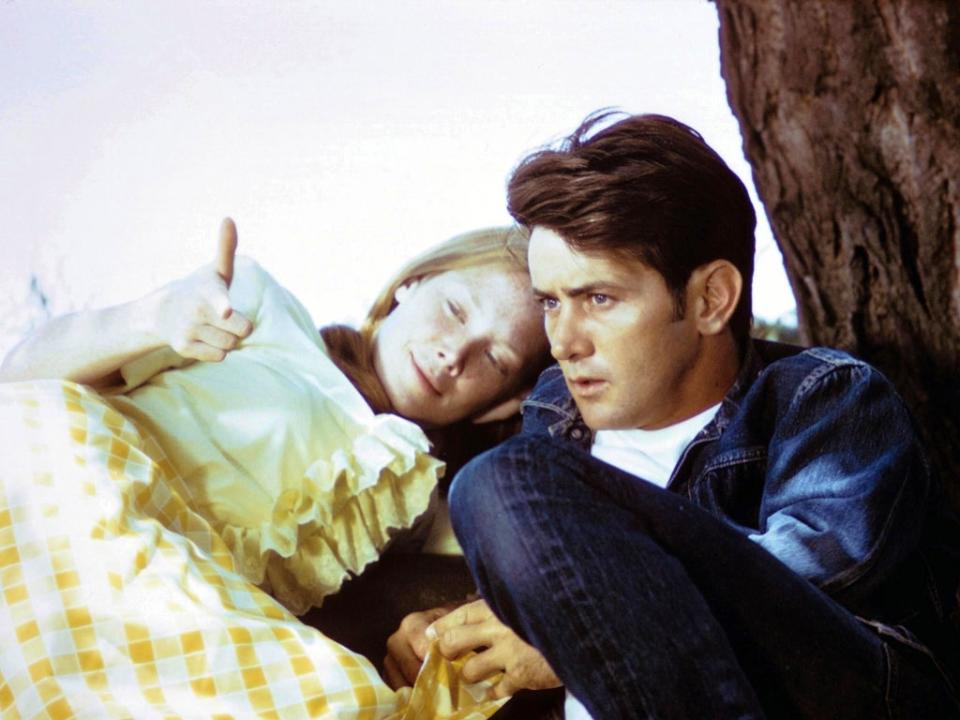
It’s funny, though, that she sees herself as somehow lesser, I tell her. Because she is an artist, too, surely? She mouths a quiet “Thank you.” I confess to having spent a few days listening to a largely forgotten country album she released in 1983 – yet another string to her creative bow – called Hangin’ Up My Heart. It feels of a piece with the release of Coal Miner’s Daughter three years earlier, but she never seems to talk about it – was it a good experience?
“Oh, yes!” She lights up, her hands at the sides of her face almost in disbelief. “I got to work with people that I idolised!” Her voice drops to a whisper again. “Rodney Crowell… JD Souther… Emmylou Harris… Rosanne Cash. God, the list goes on, and all because of playing Loretta Lynn. My dream of all dreams was to make music with these musicians who are far better than me. Far better! And they sang on my record. It was the most fabulous thing.”
And with that, I realise that Spacek has spent much of her interview talking about other people. She has an impressive ability to pivot any answer away from herself. It doesn’t feel like deflection, though; more like inherent awe – as if she’s heard a delicious secret, and wants to let you in on it, too. I ask her if she’s naturally quite a modest person.
“I must be. I guess so. I… I know really great artists,” she says, emphasising the “really” like she’s revving up a car engine. “And so much of my success has been because I’ve been at the right place at the right time. I met Terry Malick, and then went from that to… you know, I kind of represented the young everywoman of the Seventies, and then one thing led to another. There are people who are far more talented than me… so many great artists out there who don’t ever get the break.”
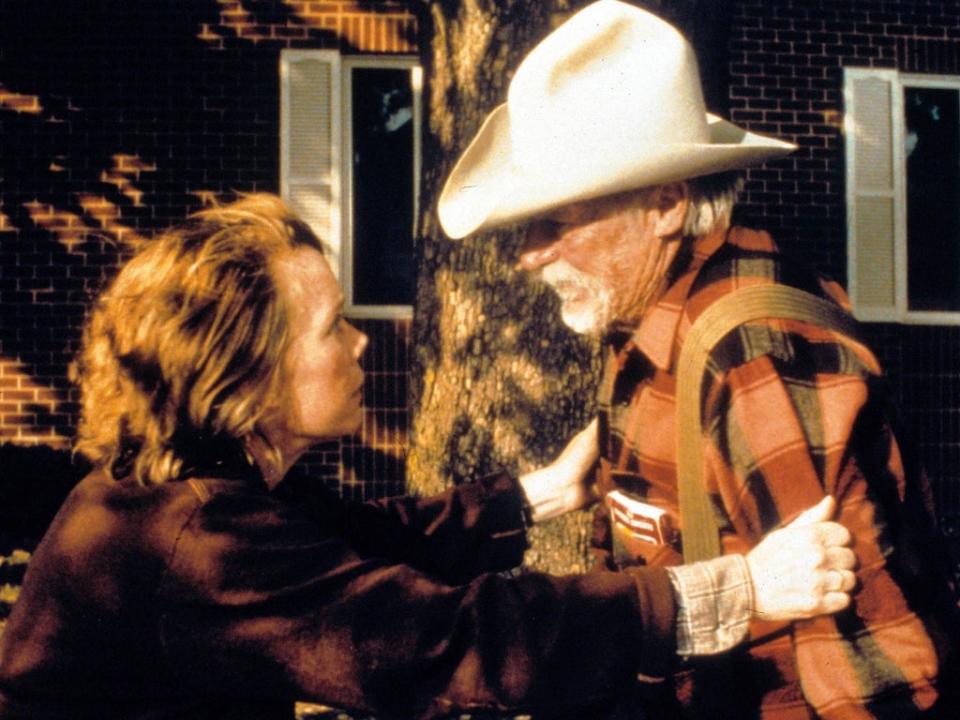
She thinks back to David Lynch, and his years of struggle before hitting it big. “He was a painter and a filmmaker, and when he was working on [his first film] Eraserhead we’d go over to his house and he’d have made these sculptures out of piles of dirt, just with a twig in it. He’d do it all for the right reasons – because it was in him and it had to come out. God, did it ever pay off. He’s just a great, funny, talented guy and my husband’s best friend. So I get to rub elbows with him.”
I’m curious where her bravery comes from, in spite of her own tendency to downplay herself. I think back to the opening sequence of Carrie, in which Spacek’s character is in the showers of her high school gym and gets her first period. She has no idea what is happening to her, and shrieks with horror while her classmates heckle and pelt her with tampons. “Oh God,” Spacek says, biting her lip. “It was terrifying. I’m also very shy, and I’m an introvert.” Not a great combination for someone playing that scene. She had no idea how to approach it. “I went to [director] Brian De Palma and said: ‘Tell me about this scene, what is it like?’ And he turns to me and he says: ‘It’s like getting hit by a Mack truck.’” (Basically a massive lorry, for any non-American readers.)
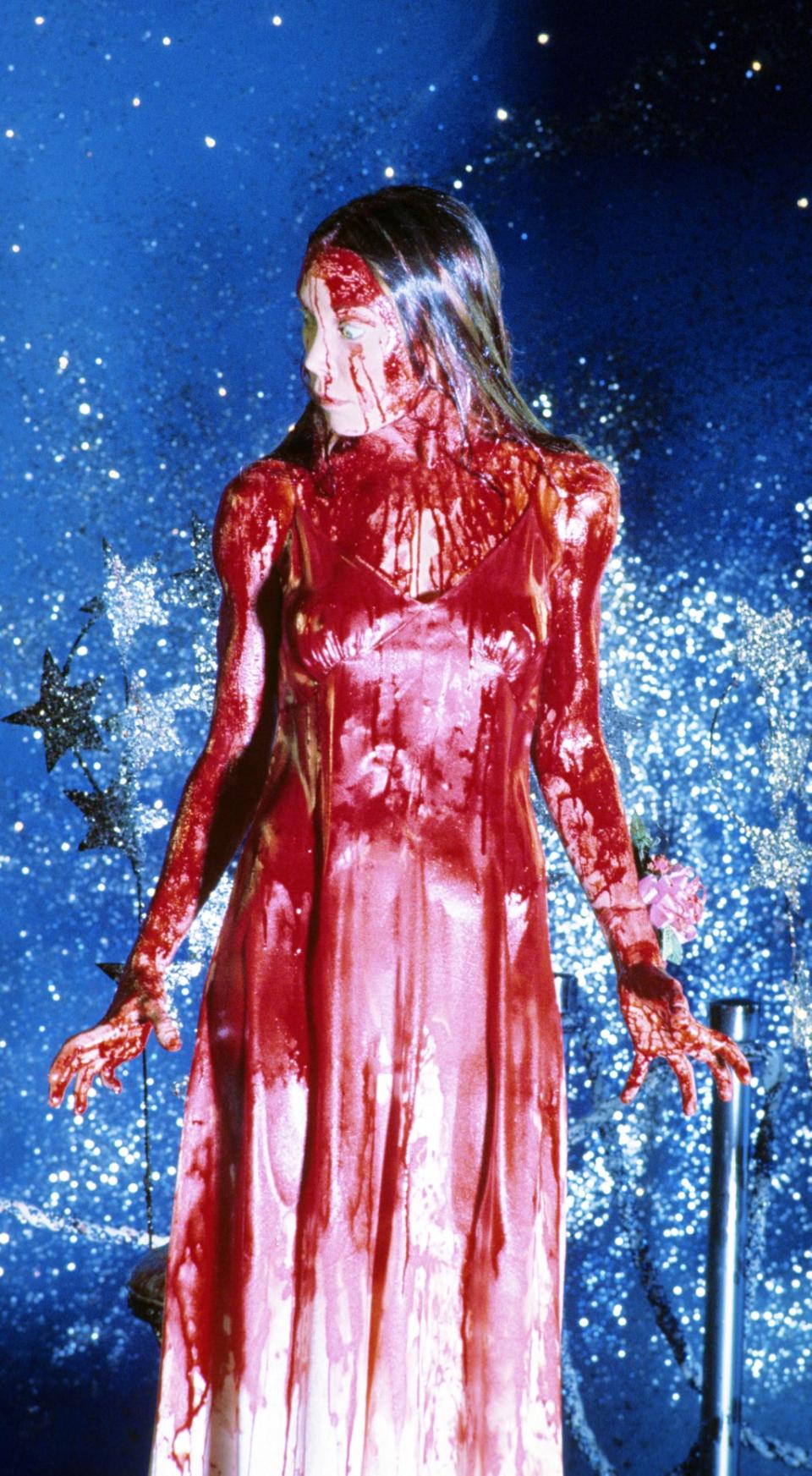
She asked for advice from her husband, who she discovered – funnily enough – had once been run over by a car. Not a Mack truck, per se, but it’d do. “So in that scene, what’s going on in my head is [Jack] walking along the side of the road when he was about 11 or 12. It’s snowing, and he’s looking at Christmas lights. And then he saw car lights. There was a car coming down the road right at him, and it ran him over. So, when Carrie’s in the shower, I’m seeing those Christmas lights, and then the horror of the blood…” Spacek holds her hands aloft and unsteady, just like in the movie. “Ain’t it bizarre that something like that could work?”
Her process hasn’t changed much over the years, she says. Other than the added life experience she can pull from. Though she sometimes needs reminding of how much of it she has. A few years ago, she was filming the Netflix series Bloodline and remarked to a crew member that she was “exploring her sixth decade”, because she was in her late sixties at the time. “Then they said to me, ‘Umm… Miss Spacek, it’s your seventh decade.’” She cringes. “Ahh, s***, man! So now I’m in my seventies and that means I’m exploring my eighth decade!” She can’t quite wrap her head around it. “It’s so bizarre and so wonderful. But nobody knows anything… you just pretend like you do, I guess.”
There she goes again, downplaying it to the end.
‘Night Sky’ is streaming on Prime Video now

 Yahoo News
Yahoo News 
